七上 行为动词的一般现在时练习题 (
(完整版)一般现在时练习题附答案解析
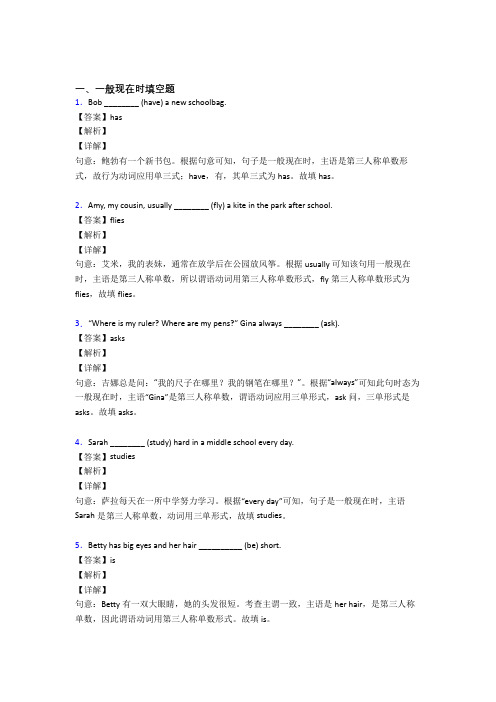
一、一般现在时填空题1.Bob ________ (have) a new schoolbag.【答案】has【解析】【详解】句意:鲍勃有一个新书包。
根据句意可知,句子是一般现在时,主语是第三人称单数形式,故行为动词应用单三式;have,有,其单三式为has。
故填has。
2.Amy, my cousin, usually ________ (fly) a kite in the park after school.【答案】flies【解析】【详解】句意:艾米,我的表妹,通常在放学后在公园放风筝。
根据usually可知该句用一般现在时,主语是第三人称单数,所以谓语动词用第三人称单数形式,fly第三人称单数形式为flies,故填flies。
3.“Where is my ruler? Where are my pens?” Gina always ________ (ask).【答案】asks【解析】【详解】句意:吉娜总是问:“我的尺子在哪里?我的钢笔在哪里?”。
根据“always”可知此句时态为一般现在时,主语“Gina”是第三人称单数,谓语动词应用三单形式,ask问,三单形式是asks。
故填asks。
4.Sarah ________ (study) hard in a middle school every day.【答案】studies【解析】【详解】句意:萨拉每天在一所中学努力学习。
根据“every day”可知,句子是一般现在时,主语Sarah是第三人称单数,动词用三单形式,故填studies。
5.Betty has big eyes and her hair __________ (be) short.【答案】is【解析】【详解】句意:Betty有一双大眼睛,她的头发很短。
考查主谓一致,主语是her hair,是第三人称单数,因此谓语动词用第三人称单数形式。
故填is。
6.The little girl ________ (dress) herself every morning.【答案】dresses【解析】【详解】句意:那个小女孩每天给自己穿衣服。
人教版七年级英语上册 一般现在时专练
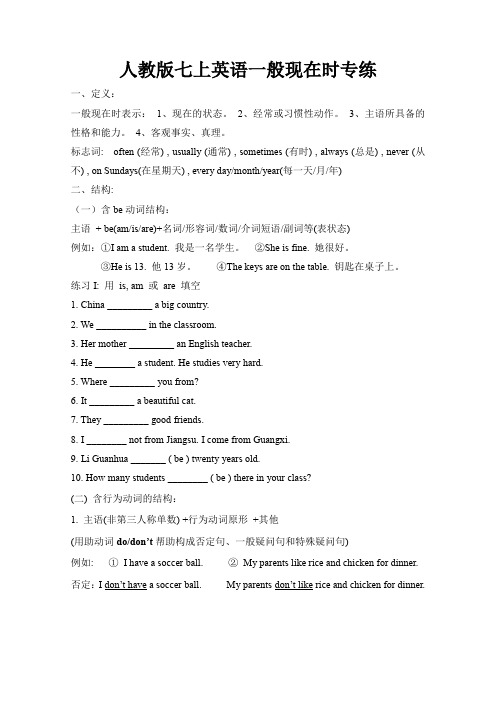
人教版七上英语一般现在时专练一、定义:一般现在时表示:1、现在的状态。
2、经常或习惯性动作。
3、主语所具备的性格和能力。
4、客观事实、真理。
标志词: often (经常) , usually (通常) , sometimes (有时) , always (总是) , never (从不) , on Sundays(在星期天) , every day/month/year(每一天/月/年)二、结构:(一)含be动词结构:主语+ be(am/is/are)+名词/形容词/数词/介词短语/副词等(表状态)例如:①I am a student. 我是一名学生。
②She is fine. 她很好。
③He is 13. 他13岁。
④The keys are on the table. 钥匙在桌子上。
练习I: 用is, am 或are 填空1. China _________ a big country.2. We __________ in the classroom.3. Her mother _________ an English teacher.4. He ________ a student. He studies very hard.5. Where _________ you from?6. It _________ a beautiful cat.7. They _________ good friends.8. I ________ not from Jiangsu. I come from Guangxi.9. Li Guanhua _______ ( be ) twenty years old.10. How many students ________ ( be ) there in your class?(二) 含行为动词的结构:1. 主语(非第三人称单数) +行为动词原形+其他(用助动词do/don’t帮助构成否定句、一般疑问句和特殊疑问句)例如: ①I have a soccer ball. ②My parents like rice and chicken for dinner. 否定:I don’t have a soccer ball. My parents don’t like rice and chicken for dinner.疑问:Do you have a soccer ball? Do your parents like rice and chicken for dinner.2.主语(第三人称单数) +行为动词的第三人称单数形式+其他(用助动词does/doesn’t帮助构成否定句、一般疑问句和特殊疑问句,行为动词用回原形)例如:Jenny/She has a blue jacket.否定句:Jenny/She doesn’t have a blue jacket.疑问句:Does Jenny/she have a blue jacket?(三)行为动词第三人称单数加-s 的形式(规则)1. 一般情况直接加- s:like--likes2. 辅音+y,把y变为i,再加-es: study-studies(学习)3. 以s,x,ch,sh 结尾,加-es: watch-watches(观看) teach-teaches(教)4. 特殊have-has,do-does,go-goes练习II. 用所给动词的正确形式填空。
初一英语语法一般现在时练习
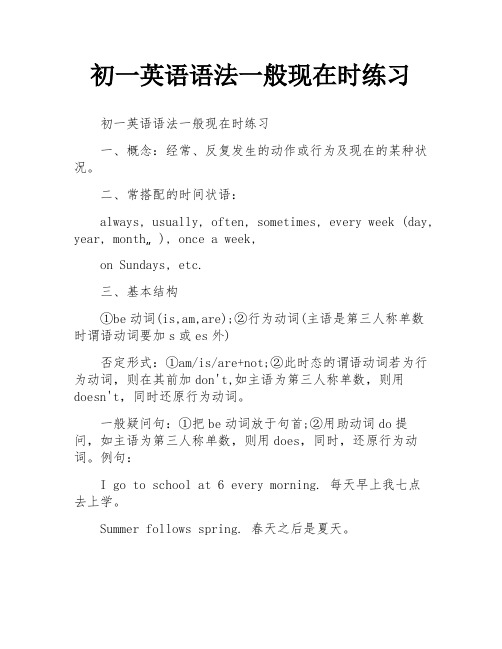
初一英语语法一般现在时练习初一英语语法一般现在时练习一、概念:经常、反复发生的动作或行为及现在的某种状况。
二、常搭配的时间状语:always, usually, often, sometimes, every week (day, year, month…), once a week,on Sundays, etc.三、基本结构①be动词(is,am,are);②行为动词(主语是第三人称单数时谓语动词要加s或es外)否定形式:①am/is/are+not;②此时态的谓语动词若为行为动词,则在其前加don't,如主语为第三人称单数,则用doesn't,同时还原行为动词。
一般疑问句:①把be动词放于句首;②用助动词do提问,如主语为第三人称单数,则用does,同时,还原行为动词。
例句:I go to school at 6 every morning. 每天早上我七点去上学。
Summer follows spring. 春天之后是夏天。
I learned that the earth goes around the sun when I was in primary school. 我在小学就学过地球是围绕太阳转的。
Pride goes before a fall. 骄者必败。
四、基本用法:1) 描述当前时间内经常出现、反复发生的动作或存在的状态。
在这种情景中,句子常带有表示频率的时间状语:always , everyday , often , once a week (month , year , etc.) , sometimes , seldom , usually等等,以表示句中的动作或状态是习惯性的、经常性的。
例如:They raise ducks as a sideline .他们以养鸭为副业。
She doesn't often write to her family, only once a month. 她不常给家里写信,仅一月一封而已。
七年级上册Unit02行为动词的一般现在时语法及相关练习
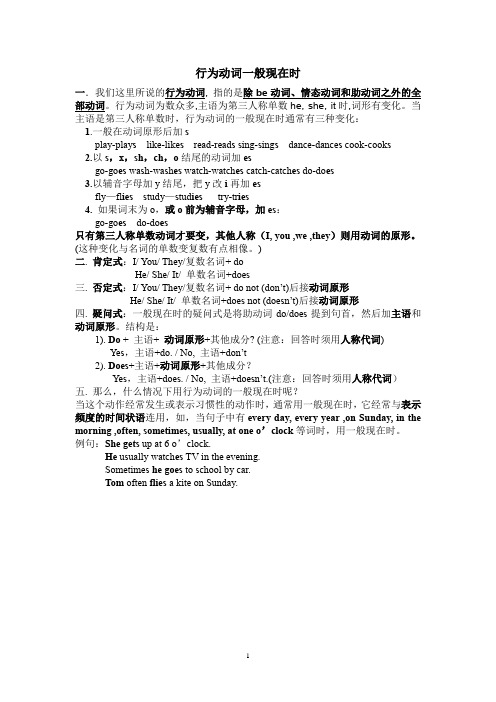
行为动词一般现在时一.我们这里所说的行为动词, 指的是除be动词、情态动词和助动词之外的全部动词。
行为动词为数众多,主语为第三人称单数he, she, it时,词形有变化。
当主语是第三人称单数时,行为动词的一般现在时通常有三种变化:1.一般在动词原形后加splay-play s like-like s read-read s sing-sing s dance-dance s cook-cook s2.以s,x,sh,ch,o结尾的动词加esgo-go es wash-wash es watch-watch es catch-catch es do-do es3.以辅音字母加y结尾,把y改i再加esfly—fl ies study—stud ies try-tr ies4.如果词末为o,或o前为辅音字母,加es:go-go es do-do es只有第三人称单数动词才要变,其他人称(I, you ,we ,they)则用动词的原形。
(这种变化与名词的单数变复数有点相像。
)二. 肯定式:I/ You/ They/复数名词+ doHe/ She/ It/ 单数名词+does三. 否定式:I/ You/ They/复数名词+ do not (don’t)后接动词原形He/ She/ It/ 单数名词+does not (doesn’t)后接动词原形四. 疑问式:一般现在时的疑问式是将助动词do/does提到句首,然后加主语和动词原形。
结构是:1). Do + 主语+ 动词原形+其他成分? (注意:回答时须用人称代词)Yes,主语+do. / No, 主语+don’t2). Does+主语+动词原形+其他成分?Yes,主语+does. / No, 主语+doesn’t.(注意:回答时须用人称代词)五. 那么,什么情况下用行为动词的一般现在时呢?当这个动作经常发生或表示习惯性的动作时,通常用一般现在时,它经常与表示频度的时间状语连用,如,当句子中有every day, every year ,on Sunday, in the morning ,often, sometimes, usually, at one o’clock等词时,用一般现在时。
初一英语动词时态练习题50题

初一英语动词时态练习题50题1. I _____ breakfast at 7:00 every day.A.haveB.hasC.havingD.to have答案:A。
本题考查一般现在时中动词的用法。
主语是I,非第三人称单数,谓语动词用原形have。
has 用于第三人称单数;having 是现在分词;to have 是动词不定式,都不符合题意。
2. My sister _____ to school by bus.A.goB.goesC.goingD.to go答案:B。
主语My sister 是第三人称单数,谓语动词用goes。
go 用于非第三人称单数;going 是现在分词;to go 是动词不定式,都不符合题意。
3. We _____ English classes on Monday and Wednesday.A.haveB.hasC.havingD.to have答案:A。
主语We 是复数,谓语动词用原形have。
has 用于第三人称单数;having 是现在分词;to have 是动词不定式,都不符合题意。
4. He _____ his homework after school.A.doB.doesC.doingD.to do答案:B。
主语He 是第三人称单数,谓语动词用does。
do 用于非第三人称单数;doing 是现在分词;to do 是动词不定式,都不符合题意。
5. They _____ sports every afternoon.A.playB.playsC.playingD.to play答案:A。
主语They 是复数,谓语动词用原形play。
plays 用于第三人称单数;playing 是现在分词;to play 是动词不定式,都不符合题意。
6. My mother _____ dinner for us every day.A.cookB.cooksC.cookingD.to cook答案:B。
译林版(2024)七年级英语上册Unit 2 Hobbies 单词默写词组语法基础
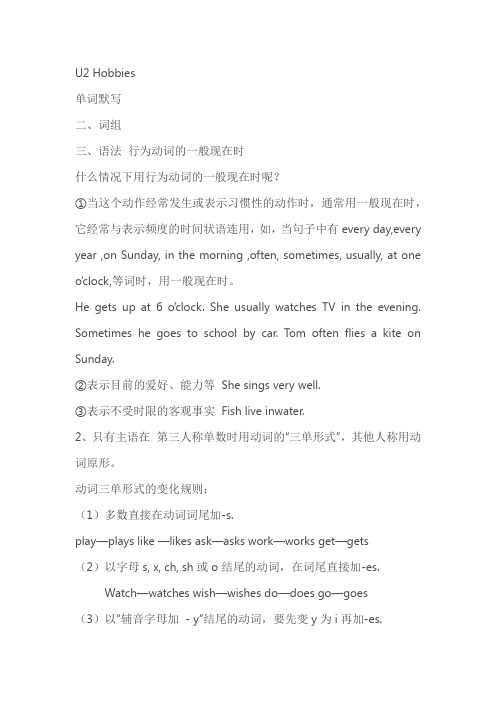
U2 Hobbies单词默写二、词组三、语法行为动词的一般现在时什么情况下用行为动词的一般现在时呢?①当这个动作经常发生或表示习惯性的动作时,通常用一般现在时,它经常与表示频度的时间状语连用,如,当句子中有every day,every year ,on Sunday, in the morning ,often, sometimes, usually, at one o’clock,等词时,用一般现在时。
He gets up at 6 o’clock. She usually watches TV in the evening. Sometimes he goes to school by car. Tom often flies a kite on Sunday.②表示目前的爱好、能力等She sings very well.③表示不受时限的客观事实Fish live inwater.2、只有主语在第三人称单数时用动词的“三单形式”,其他人称用动词原形。
动词三单形式的变化规则:(1)多数直接在动词词尾加-s.play—plays like —likes ask—asks work—works get—gets(2)以字母s, x, ch, sh或o结尾的动词,在词尾直接加-es.Watch—watches wish—wishes do—does go—goes(3)以“辅音字母加- y”结尾的动词,要先变y为i再加-es.try—tries study—studies cry— cries fly —flies.不规则变化:be — is have— has3、主要句式:一)、否定句:含行为动词一般现在时的否定式是在动词原形前加助动词d o not (don’t );主语是第三人称单数时在动词原形前加助动词does not (doesn’t),其结构为:1)主语+ don’t+ 动词原形They don’t work here. I don’t go to school on Sundays.2)主语(第三人称单数)+ doesn’t+ 动词原形She doesn’t like sports. The boy doesn’t study hard.注意*:如句中用了never(从不),hardly(很少、几乎不)等词来表示否定意义,就不能再使用助动词don’t 或doesn’t , 试比较:I don’t know you. I hardly know you.二)、疑问句:一般现在时的疑问式在句首加助动词do, 主语为第三人称单数时在句首加does,其结构是:1)Do + 主语+ 动词原形…They live near our school. →Do they live near our schoolThe students like learning English. →Do the students like l earning EnglishDoes + 主语(第三人称单数)+ 动词原形…He watches TV every evening. →Does he watch TV every evening My father teaches Chinese. →Does your father teach Chinese简略回答用助动词do/does 和don’t/doesn’t 代替行为动词。
(英语)英语一般现在时练习题20篇含解析
(英语)英语一般现在时练习题20篇含解析一、初中英语一般现在时1.Xiao Ming never ________ home on foot. She often takes the subway.A. go toB. goes toC. walksD. goes【答案】 D【解析】【分析】句意:小明从不不行回家,他经常乘地铁。
词组:go home回家。
主语Xiao Ming 是第三人称单数,故用动词后加-s,因此选D。
【点评】考查一般现在时的第三人称单数形式。
2.Millions of people _________ the Great wall every year.A. visitedB. visitC. will visitD. are vesting 【答案】 B【解析】【分析】句意:成千万的人每年参观长城。
根据every year,可知句子时态为一般现在时,故答案是B。
【点评】考查一般现在时,注意根据时间状语确定句子的时态。
3.She _____ out alone at night.A. dare not to goB. dares not goC. doesn't dare to goD. doesn't dares go【答案】 C【解析】【分析】句意:晚上她不敢一个人出去。
dare可以作情态动词也可以作行为动词,作情态动词时,后面直接跟动词原形,没有人称与数的变化,构成否定时直接在dare 后加not,作行为动词时后跟动词不定式,构成否定需要助动词,故答案是C。
【点评】考查dare的用法,注意dare做情态动词和行为动词的用法上的区别。
4.If he _____ the money, he _____ a lot of clothes.A. has; will buyB. had; boughtC. had; would buyD. had; will buy 【答案】 A【解析】【分析】句意:如果他有钱,他会买许多衣服。
初一英语一般现在时练习题及答案(2021年整理)
初一英语一般现在时练习题及答案(word版可编辑修改)编辑整理:尊敬的读者朋友们:这里是精品文档编辑中心,本文档内容是由我和我的同事精心编辑整理后发布的,发布之前我们对文中内容进行仔细校对,但是难免会有疏漏的地方,但是任然希望(初一英语一般现在时练习题及答案(word版可编辑修改))的内容能够给您的工作和学习带来便利。
同时也真诚的希望收到您的建议和反馈,这将是我们进步的源泉,前进的动力。
本文可编辑可修改,如果觉得对您有帮助请收藏以便随时查阅,最后祝您生活愉快业绩进步,以下为初一英语一般现在时练习题及答案(word版可编辑修改)的全部内容。
初一英语一般现在时练习题及答案1)用动词的适当形式填空1.I like ____________ .2.He _________ English every day。
3。
We _________to school at seven in the morning。
4。
Mike________to school at seven in the morning.5。
My mother________ ______ shopping.6。
I can ________ many beautiful pictures。
7。
She_________ a model plane.8。
Do you _________________?9。
Does he__________________ ?10。
Does Nancy_________flowers on Saturday ?11。
The teachers___________________.12。
The teacher____________________.13。
The students___________ English in class。
14.The student_________ Chinese after class。
行为动词的一般现在时(Ⅲ)
行为动词的一般现在时(Ⅲ)一般现在时可表示经常性或习惯性的动作,也可表示现在的状态等。
本模块,我们学习一般现在时特殊疑问句的行为动词的一般现在时。
主语是非第三人称单数时行为动词一般现在时的特殊疑问句。
如:1. How do we go to the park?2. How do you study English?3. How do they work on the computer?4. What do we play with now?5. What do you eat for lunch?6. What do they work for?7. Where do we buy ice cream?8. Where do you play computer games?9. Where do they write their homework?能够看出,主语是非第三人称单数时,行为动词一般现在时的特殊疑问句结构为“特殊疑问词+ do +主语+谓语动词原形+其它?”。
主语是第三人称单数时行为动词一般现在时的特殊疑问句。
如:1. How does he go to the park?2. How does she study English?3. How does Miss Wang work on the computer?4. What does he play with now?5. What does she eat for lunch?6. What does Miss Wang work for?7. Where does he buy ice cream?8. Where does she play computer games?9. Where does Wang Ling write her homework?可以看出,主语是第三人称单数时,行为动词一般现在时的特殊疑问句结构为“特殊疑问词+ does +主语+谓语动词原形+其它?”。
(完整版)一般现在时练习题及答案
一、一般现在时填空题1.Miss Green _________ (teach) us English every day.【答案】teaches【解析】【详解】句意:格林小姐每天教我们英语。
teach教,动词;由句中的every day可知句子时态用一般现在时,主语Miss Green是第三人称单数形式,所以谓语动词teach也要用第三人称单数形式teaches。
故填teaches。
2.Daniel ________ (not play) football with his classmates after school.【答案】doesn’t play【解析】【详解】句意:Daniel 放学后不和同学们玩足球。
根据句意可知,句子是一般现在时,主语是第三人称单数形式,动词是行为动词,故否定句的助动词应用doesn’t,后加动词原形。
故填doesn’t play。
3.The English story ________(sound)very interesting. We all like it.【答案】sounds【解析】【分析】【详解】句意:这个英语故事听起来很有趣,我们所有人都喜欢它。
sound“听起来”,根据“We all like it”可知,用一般现在时,主语为“The English story”,故填sounds。
4.Not only the twins but also Tom always ________(mix)the sugar with coffee together【答案】mixes【解析】【详解】句意:不仅双胞胎而且Tom总是把糖和咖啡混在一起。
当not only…but also…连接两个主语时,谓语动词采取就近一致原则,即谓语动词要和与其最近的主语保持人称和数的一致,由“always”可知,时态是一般现在时,Tom是第三人称单数,所以用动词mix“混合”的第三人称单数mixes,故填mixes。
- 1、下载文档前请自行甄别文档内容的完整性,平台不提供额外的编辑、内容补充、找答案等附加服务。
- 2、"仅部分预览"的文档,不可在线预览部分如存在完整性等问题,可反馈申请退款(可完整预览的文档不适用该条件!)。
- 3、如文档侵犯您的权益,请联系客服反馈,我们会尽快为您处理(人工客服工作时间:9:00-18:30)。
一般现在时态专练
一.写出下列动词的正确形式
1.I _________(go)to school at seven in the morning.
2.Mike _________(do)his homework at eight in the evening.
3. His father often ( read) books in the library on Saturday.
4.My mother usually (watch) TV plays at home.
5. My cousin sometimes (play ) cards with me.
6. you often (study ) after school ?Yes , I do.
7. Mike and Tom usually (fly ) kites on Sunday.
8. They (go) to school by bus every day.
9. She (go ) to school by bus every day.
10.We usually (listen ) to the radio in the morning.
11. He usually (listen ) to the radio in the morning.
12. he usually (listen ) to the music at home?
No, he .
二、写出下列动词的第三人称单数
drink ______ go _____ stay _____ make ___l ook ____ have___ pass____ carry ____ come_______ watch_____ plant_______ fly ________study_______ brush________ ...
三、用括号内动词适当的形式填空
1.We often _(play) in the playground.
2. He _ (get) up a t six o’clock.
3. _you _ (brush) your teeth every morning.
4. What _(do) he usually _(do) a fter school?
5. ______ they ________(like) the World Cup?
6. Mike sometimes __________(g o) t o the park with his sister.
7. At eight at night, she _ (watch) TV with his pa rents.
8 _ Mike _ (read) English every day?
9. How many lessons _your c lassmat e________(have) on Monday?
10. What time _his m other (do) the housework?
11. He often ________(have) dinner at home.
12. Daniel and Tommy _______(be) in Class One.. 13
13. We _______(not watch) TV on Monday.
14. Nick _______(not go) to the zoo on Sunday.
15. ______ they ________(like) the World Cup?
四、改句子
1.Do you often play football after school? (肯定回答)
2.I have many books. (改为否定句)
3.Gao Shan’s sister likes playing table tennis (改为否定句
4.She lives in a small town near New York.(改为一般疑问句)
5.I watch TV every day. (改为一般疑问句)
6.Tom pl ays sports every day.变一般疑问句:
7 .He likes his new room变否定句:
8.He does his homewor k every week.变否定句:
9..My sister has a volleyball.变一般疑问句:
10.Tom plays sports every day.变一般疑问句:
11 .He likes his new room变否定句:
12.He does his homework ev ery week.变否定句:
13.My sister has a volleyball.变一般疑问句
14.I have six baseballs .(划线提问)
15.We have an English class every day.变一般疑问句
五、改错(划出错误的地方,将正确的写在横线上)
1. Is your brother speak English? __________________
2. Does he likes going fishing? __________________
3. He likes play games after class. __________________
4. Mr. Wu teachs us English. __________________
5. S he don’t do her homework on Sundays. _________________。
